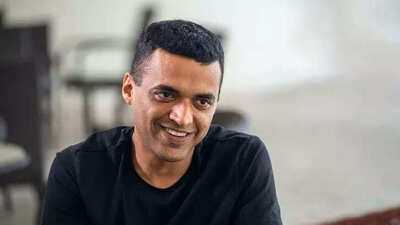Deepinder Goyal's longevity venture Continue to probe gravity's impact on human ageing
Eternal founder and CEO Deepinder Goyal’s longevity initiative, Continue, is sharpening its scientific focus on how gravity may influence human ageing. New details published on its website outline a research programme built on the hypothesis that gravitational force contributes to a decline in cerebral blood flow (CBF) as people age.
According to Continue, CBF naturally drops by up to 0.7% each year, translating into a 20-40% fall between ages 20 and 80. Lower CBF, it says, correlates with nearly double the risk of all-cause mortality. The project, however, notes that gravity is not the sole cause of ageing but may be an overlooked driver worth investigating.

Continue plans to deploy its previously announced $25 million fund to support researchers, labs and independent scientists working to validate or challenge this hypothesis.
Nitish Kumar, a member of Continue Research’s science team, told ET there is sufficient evidence that gravity affects the brain and cardiovascular system, but the magnitude of that impact remains unclear. “If you fight gravity properly, how much can you add to the average human lifespan? We don’t know yet, but we can definitely add some if we study this well,” he said. The team expects to publish its first research paper soon and has built an experimental device to monitor CBF.
With this approach, Continue enters a wide field of work on ageing that spans stem-cell regeneration, metabolic and caloric-restriction pathways, neurovascular ageing, and telomere biology.
Besides Continue, Goyal, who owns a nearly 4% stake in Eternal worth over Rs 11,000 crore (or around $1.3 billion), has invested $20 million in LAT Aerospace, which is working to build an eight-seater, low-cost, short takeoff and landing (STOL) aircraft focused on regional connectivity.
Research roadmap
Continue has outlined its next phase of work, saying it “believes that inversion may be the most direct and immediate intervention available to reverse gravity’s impact on the ageing process.” Inversion theory suggests that being upside down may reduce gravitational load on the body.
The company has commissioned studies to map how gravity affects brain ageing. These include:
Planned future studies will examine how artificial gravity cycles influence neurovascular health, interactions between cerebral perfusion and vascular ageing, whether hypoperfusion drives capillary loss, and how gravitational load shapes key cellular pathways. Researchers will also analyse gender differences and links between metabolic energy use, gravity and CBF.
According to Continue, CBF naturally drops by up to 0.7% each year, translating into a 20-40% fall between ages 20 and 80. Lower CBF, it says, correlates with nearly double the risk of all-cause mortality. The project, however, notes that gravity is not the sole cause of ageing but may be an overlooked driver worth investigating.
Continue plans to deploy its previously announced $25 million fund to support researchers, labs and independent scientists working to validate or challenge this hypothesis.
Nitish Kumar, a member of Continue Research’s science team, told ET there is sufficient evidence that gravity affects the brain and cardiovascular system, but the magnitude of that impact remains unclear. “If you fight gravity properly, how much can you add to the average human lifespan? We don’t know yet, but we can definitely add some if we study this well,” he said. The team expects to publish its first research paper soon and has built an experimental device to monitor CBF.
With this approach, Continue enters a wide field of work on ageing that spans stem-cell regeneration, metabolic and caloric-restriction pathways, neurovascular ageing, and telomere biology.
Besides Continue, Goyal, who owns a nearly 4% stake in Eternal worth over Rs 11,000 crore (or around $1.3 billion), has invested $20 million in LAT Aerospace, which is working to build an eight-seater, low-cost, short takeoff and landing (STOL) aircraft focused on regional connectivity.
Research roadmap
Continue has outlined its next phase of work, saying it “believes that inversion may be the most direct and immediate intervention available to reverse gravity’s impact on the ageing process.” Inversion theory suggests that being upside down may reduce gravitational load on the body.
The company has commissioned studies to map how gravity affects brain ageing. These include:
- charting age-linked microvascular changes in mice;
- studying whether brief exposure to microgravity alters capillary density or lifespan;
- identifying brain regions most vulnerable to perfusion loss;
- testing whether chronically reduced blood flow leads to capillary decline or blood–brain barrier damage.
Planned future studies will examine how artificial gravity cycles influence neurovascular health, interactions between cerebral perfusion and vascular ageing, whether hypoperfusion drives capillary loss, and how gravitational load shapes key cellular pathways. Researchers will also analyse gender differences and links between metabolic energy use, gravity and CBF.
Next Story